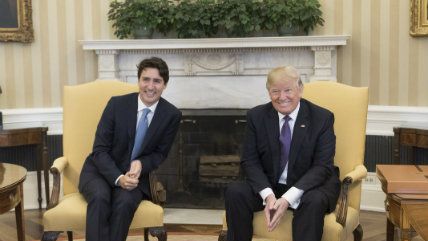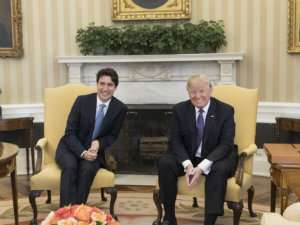Trump's Lumber Tariff Shows He is a Depressing Continuation of the Status Quo
Not a nightmarish departure from it.


The Trump Administration announced yesterday that it would be slapping tariffs averaging 20 percent on soft-wood lumber coming from Canada (they're not sending us their best trees you know), marking the first substantive protectionist action taken by the Administration.
The dispute over Canadian lumber exports to the US is a long simmering one between the two NAFTA partners. But to read some media accounts of the event, one would think this was a unique triumph of Trumpain aggression.
The news aggregator Axios described the move as a "big win for Steve Bannon." The Huffington Post, while saying the tariff was expected, still managed to find itself shocked at "the enthusiasm with which the new American administration flung itself into the lumber hostilities." Even the New York Times ran with a headline describing the lumber dispute as a "new trade front."
In fact, cheap Canadian lumber is one of the oldest boogeyman in the US timber industry, right up there with the fiendish agropelter. As such it makes more sense to view this latest action by Trump as another case of the president being a depressing continuation of the status quo, as opposed to a nightmarish departure from it.
As far back as the 1980's US timber interests have been raising their old saw about stumpage fees charged to Canadian loggers. In Canada, most logging is done by private companies on public land, for which they must pay a "stumpage fee" to the government. The US timber industry's claim has always been that these stumpage fees are artificially low, and as such amount to an unjust subsidy to Canadian lumber.
The first investigation of these fees by the US Commerce Department in 1983 found that they did not amount to an unjust subsidy, temporarily thwarting the US lumber industries plan to impose countervailing duties on their northern competition.
But following a toxic combination of a more aggressive Commerce Department and a better funded, better organized industry effort, the US government started to see things a different way.
In 1986, the Commerce Department reversed itself and sought to levy a 15 percent tariff on Canadian wood.
That decision 1986 action has since set off some three decades of US tariffs, Canadian protest, and international arbitration before both NAFTA and WTO courts, who have mostly sided with the Canadians. Full-blown trade war has generally been avoided through bi-lateral agreements that see the Canadians voluntarily reduce their exports in exchange for the US lumber industry agreeing to not pursue countervailing tariffs.
However, these bi-lateral agreements have always been temporary band-aids on this long simmering trade dispute, and their expirations has seen the reapplication of US tariffs in both 1992 and 2001.
The latest of these bi-lateral agreements expired back in October 2016.
In June 2016, President Obama and Prime Minister Justin Trudeau released a joint statement saying that they were committed to finding a "durable and equitable solution" on the issue of lumber imports, but despite the two's supposed bromance, no deal was forthcoming.
Thus when the US-Canada deal did expire in October, the US Lumber Coalition fulfilled its historic role of filling a countervailing duty claim with the US Department of Commerce.
And now the Trump administration is sticking closely with historical precedent and siding with US lumber. Commerce Secretary Wilbur Ross released a short statement yesterday saying that his department had found it necessary to levy some $1 billion in import duties on Canadian lumber, adding that "his is not our idea of a properly functioning Free Trade Agreement."
Also true to form is the Canadian response, in which their Ministers of Natural Resources and Foreign Affairs have promised to "vigorously defend the interests of the Canadian softwood lumber industry, including through litigation."
So while it is right and proper for free trade advocates everywhere to bemoan this latest protectionist action by the Trump Administration, small comfort can be taken in the fact that this represents a continuation as opposed to a true worsening of policy.
And if history is any guide, the US and Canada will likely—after multiple rounds of WTO arbitration—reach some sort of bi-lateral deal on lumber imports for which President Trump will no doubt claim all the credit.
Rent Free is a weekly newsletter from Christian Britschgi on urbanism and the fight for less regulation, more housing, more property rights, and more freedom in America's cities.


Show Comments (16)